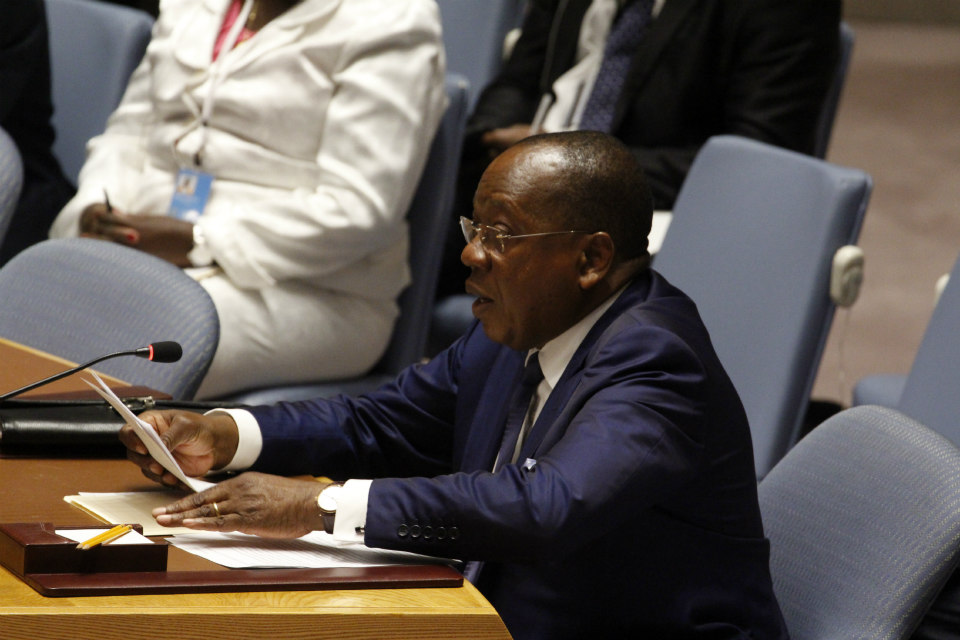Supporting UNOCA's efforts to ensure peace in Central Africa
Statement by Ambassador Jonathan Allen, UK Deputy Permanent Representative to the UN, at the Security Council Briefing on Central Africa and Lake Chad Basin.

Thank you Mr President and may I also thank our briefers today – Ambassador Fall for your report and also for your team’s work in this challenging region. And also Ambassador Allam-Mi, thank you for your comments, and also welcome to the Security Council. It’s good to see you today sir because regional organizations like yours are essential and we are pleased you’ve been able to demonstrate today the cooperation between the regional group and UNOCA.
Mr President, the United Kingdom remains concerned by the security and political situation in Central Africa. Many of those concerns are reflected in the Secretary-General’s report, including the threats from terrorist groups such as Boko Haram and other groups in the Lake Chad Basin, and the Lord’s Resistance Army in Central African Republic and DRC. And we note with horror the use of women and girls as suicide bombers by Boko Haram.
As we’ve discussed many times before in this Council, both military and non-military action is required to address these threats. We must understand their root causes and the political, economic and humanitarian needs of the population. And it is essential that we take a coherent, “whole of UN” approach to tackle both existing problems and prevent further deterioration in this region.
This year, 10 million people are in need of humanitarian assistance in the Lake Chad Basin. The United Kingdom has committed £300 million to tackling the crisis over the next five years. And we call upon other international donors to help make up funding shortfalls for humanitarian operations across the region.
Mr President, we are also concerned by the situation in Cameroon and the number of casualties that have resulted amongst both civilians and Cameroon’s security forces. Citizens have the right of peaceful protest. It is the government’s responsibility to protect demonstrators while also protecting the safety and security of all citizens. We call for all parties to reject violence, pursue dialogue and urgently take action to reduce tensions. Failure to do so will only cause the already concerning situation to deteriorate further. In this regard, we welcome President Biya’s New Year’s announcement to pursue dialogue, decentralisation and restraint. And we strongly encourage the government to take further steps to give effect to this announcement. We commend UNOCA’s support as part of broader international efforts to find a lasting solution to the current crisis, and we would encourage intensification of these efforts and ask that we are kept regularly informed on progress.
Mr President, we recognise UNOCA’s efforts elsewhere in the region, including the mobilisation of support for the African Peace Initiative in the Central African Republic with regional partners and we encourage this to continue. UNOCA also has a crucial role supporting states in the subregion to hold timely, transparent and inclusive elections and supporting ECCAS’s efforts to lay the groundwork for structural prevention of election-related violence.
We are concerned by the threat of piracy in the Gulf of Guinea and we appreciate UNOCA’s reporting on this matter. Further, more detailed reporting on the problem and the work being done to combat it should be carried out, given the heightened and significant threat to international shipping and regional prosperity.
In addition to regional governments, regional organisations - including the African Union, ECCAS, CMAC, the Gulf of Guinea Commission and the Lake Chad Basin Commission - are essential to address the challenges to peace and security, promote democratic governance and enhance regional cooperation. Inter-regional cooperation, particularly on issues like the Sahel, are also crucial, and we welcome the announcement that ECCAS and ECOWAS will hold a joint summit in July. We encourage UNOCA and UNOWAS to continue to support this inter-regional approach.
Mr President, UNOCA has demonstrated that it can be a valuable partner for regional governments and organisations. In order to make the best use of the resources available, UNOCA should focus on building the capacity of regional entities to deliver crisis prevention work, such as preventative diplomacy, early warning mechanisms and mediation, and support UN agencies in priority thematic areas including gender.
Mr President, the United Kingdom appreciates UNOCA’s efforts in the region and we encourage UNOCA to improve its communication of this good work. This will ensure those outside the UN system can better understand UNOCA’s ongoing work and support it whenever possible.
Thank you Mr President.